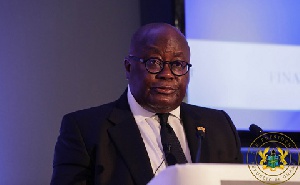President Nana Addo Dankwa Akufo-Addo, Tuesday said, though technology would dominate the future and lead to transformational development, its disruptive tendencies ought not to be ignored.
“Whilst doing all we can to deliver access to basic living amenities for our people, especially in Africa, Governments must recognize that investing in ICT infrastructure, application and solutions, has the potential to transform society, grow the economy, create jobs, and improve the welfare of their peoples.
“In as much as we recognize the possibilities of the new digital age, we are also mindful of its disruptive tendency,” the President said when he delivered a statement at the Africa-Europe High-Level Forum in Vienna, Austria.
The Forum, under the theme: "Taking Co-operation to the Digital Age," was an initiative of the Austrian Chancellor Sebastian Kurz, and Rwandan Leader Paul Kagame. It brought together European and African leaders, together with Chief Executive Officers of major global companies, innovation champions, start-ups and other stakeholders.
The forum, a springboard to leverage on other interventions, seeks to enhance the quality of cooperation between Africa and Europe, reflect and act to secure prosperity and competitiveness on both continents as well as deepen the relationship in all aspects with a specific focus on taking cooperation to the digital age.
President Akufo-Addo told the gathering that the concept of a single world community linked by telecommunications, demanded interdependence, co-operation and alliances are key to tackling global issues.
He stated that it was important “to harmonize our efforts at the international level to curb the menace of cyber-attacks and cyber-crimes, as well as its effects on critical sectors of life such as in the aviation industry, in the supply of utilities, and in the electoral process.”
Africa, the President held, must be proactive in order to guarantee collaborative success on the international stage, saying, “We must develop and implement our own cyber security policies, which would go a long way to securing the Critical National Information Infrastructure (CNII), and make it resilient.”
Taking co-operation into the digital age, President Akufo-Addo indicated, would mean that Africa must as a matter of obligation, build the capacity of its peoples, ensure knowledge and know how transfer, and also provide young people with the information technology skills needed to survive and to thrive.
He sold to the meeting, Ghana’s resolve to fully digitize its economy, and the interventions being implemented by his government to achieve that vision.
“For us in Ghana, we are paying great attention to the value of the digital revolution. We are in the process of issuing a digital national identification card to all our citizens; we have created a digital property addressing system; we have implemented a mobile interoperability system to facilitate electronic financial transactions; we are providing access to digital financial services; and we are employing a paperless clearance system at our ports.
“All of these developments are being made to formalise the Ghanaian economy, and, thereby, enhance its productivity, he stated, adding that “we can secure our collective futures if we work together.”
“Let us all embrace the call, and take co-operation in the digital age to the next level,” he told the meeting.
Austria currently holds the rotating presidency of the Council of the European Union in the second half of 2018. Austria wants to give rise to the conclusions of the European Council of June 28, 2018, where Europe seeks to enhance the quality of its cooperation with Africa, moving beyond focusing on migration as a common challenge.
The High-Level Forum is expected to promote innovation and digitalisation as important enablers of future development, aimed also at assessing how current partnerships between Africa and Europe contribute to this goal, complementing the ongoing implementation of the joint declaration of the 2017 Abidjan Summit between the African Union and the European Union, which, among other things, highlighted the importance of unlocking the potential of the digital economy for Africa and Europe.
Click to view details



General News of Tuesday, 18 December 2018
Source: ghananewsagency.org

















